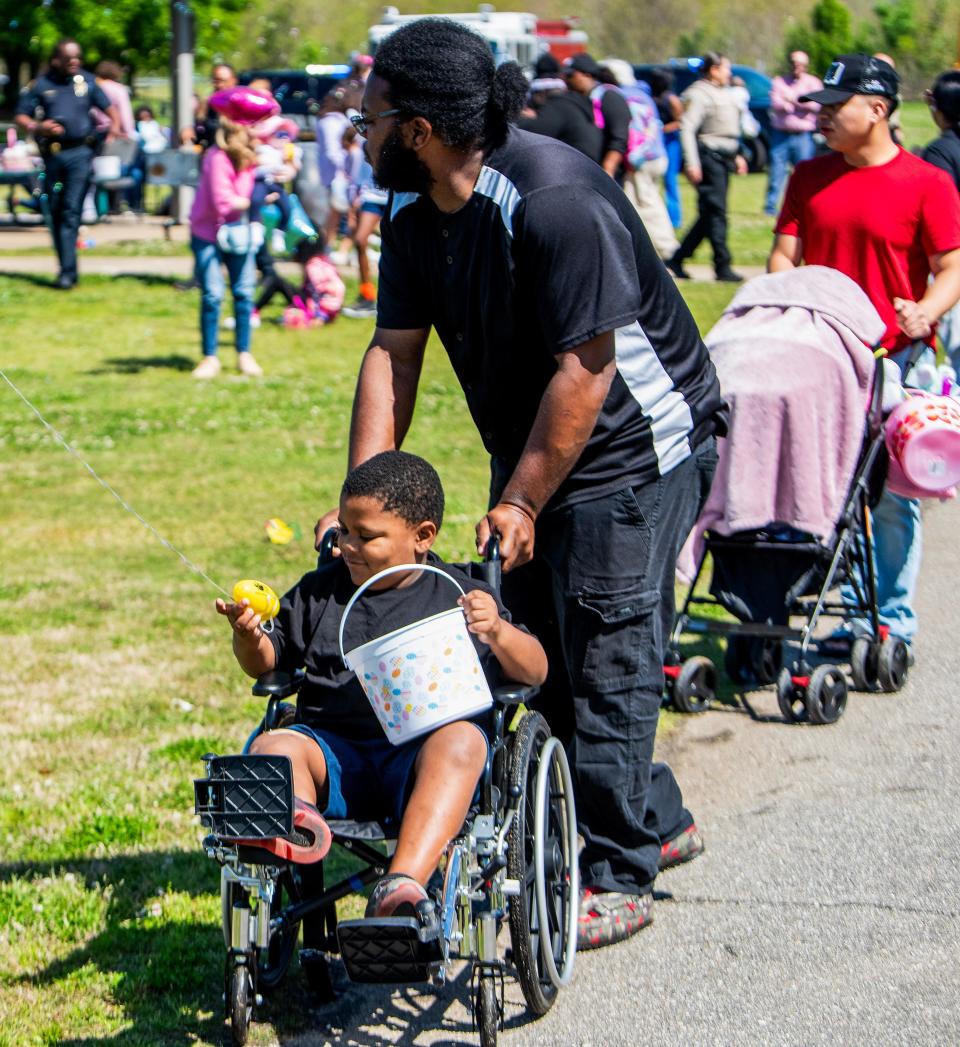How an Alabama father made Easter egg hunts accessible to deaf, blind kids nationwide
Toddlers and young kids on Wednesday morning scattered throughout Ida Belle Young Park. As they traversed the grass, the Easter eggs they were on the hunt for activated.
Some of the eggs emanated a beeping sound so that blind children could locate them, and others had balloons tied around their center for kids in wheelchairs to reach.
The Alabama Institute for Deaf and Blind (AIDB) started the accessible Easter egg hunt several years ago to further its mission of preparing individuals of all abilities to reach their full potential. The hunt is just another way to help children who have disabilities experience the world like all other kids.
“All the people we serve can do anything anybody else can,” AIDB regional director Jenny Savage said. “Really, it all got started because of a dad loving his daughter, and we're honored to participate.”
David Hyche created his first beeping egg in 2005 out of necessity. His nearly 2-year-old daughter, Rachel, had been blind since she was four months old, and doctors had also diagnosed her with autism.

A church Easter egg hunt was coming up, and Hyche didn’t want his child left out. With his history in law enforcement and explosives, he decided he had all the skills necessary to construct the beeping egg.
“Independence is what it's all about,” Hyche said. “The blind kids don't want somebody handing them an egg. They want to find them. Then, the kids in wheelchairs and walkers want to be able to retrieve the eggs themselves.”
While it was a costly endeavor at about $13.50 per egg, Hyche said the money was well worth the joy his daughter got out of fully participating in the community event.
Now, the cost per egg has gone up by a few dollars, but the International Association of Bomb Technicians and Investigators has since taken The Rachel Project on as a charitable endeavor.

Every year, the group donates around $10,000 to go toward constructing the beeping eggs.
Hyche and other volunteers get together to build the eggs in Montgomery, and from there, they get shipped all around Alabama and beyond. This year, Hyche said the beeping eggs have made their way as far as the Lavelle School for the Blind in New York City.
According to Savage, the Montgomery event had the biggest turnout it’s ever seen this year. Dozens of families attended along with community partners like the fire department, the police department, the Montgomery County Sheriff's Office and the Alabama Law Enforcement Agency.
Montgomery resident and mother Calita Banks brought her 8-year-old daughter Haley, who is blind and autistic, to the event because she had never been able to participate in an Easter egg hunt before.
“I want her to feel like other kids, like she can do anything,” Banks said. “There’s not always enough resources like this for her to do regular things.”
Hyche tries to personally attend as many egg hunts as he can. Seeing the kids light up when they find their own Easter eggs never gets old, he said, and their joy always reminding him of his own daughter, who is now 19 and on a different kind of hunt.
“She wants to be gainfully employed, and a blind, autistic person can be. She has things to offer, but it's very hard. She can't just walk in and get an interview,” Hyche said.
He hopes more business owners and employers will make the active choice to give people with disabilities a chance to show their talents, believing in the AIDB motto: “Deaf. Blind. Limitless.”
To donate to The Rachel Project or learn more information about hosting your own accessible Easter egg hunt, please visit www.iabti.org. To donate to the AIDB or learn more information about its work, please visit, www.aidb.org.
Hadley Hitson covers children's health, education and welfare for the Montgomery Advertiser. She can be reached at hhitson@gannett.com. To support her work, subscribe to the Advertiser.
This article originally appeared on Montgomery Advertiser: All about independence: Blind, deaf children hunt for Easter eggs

